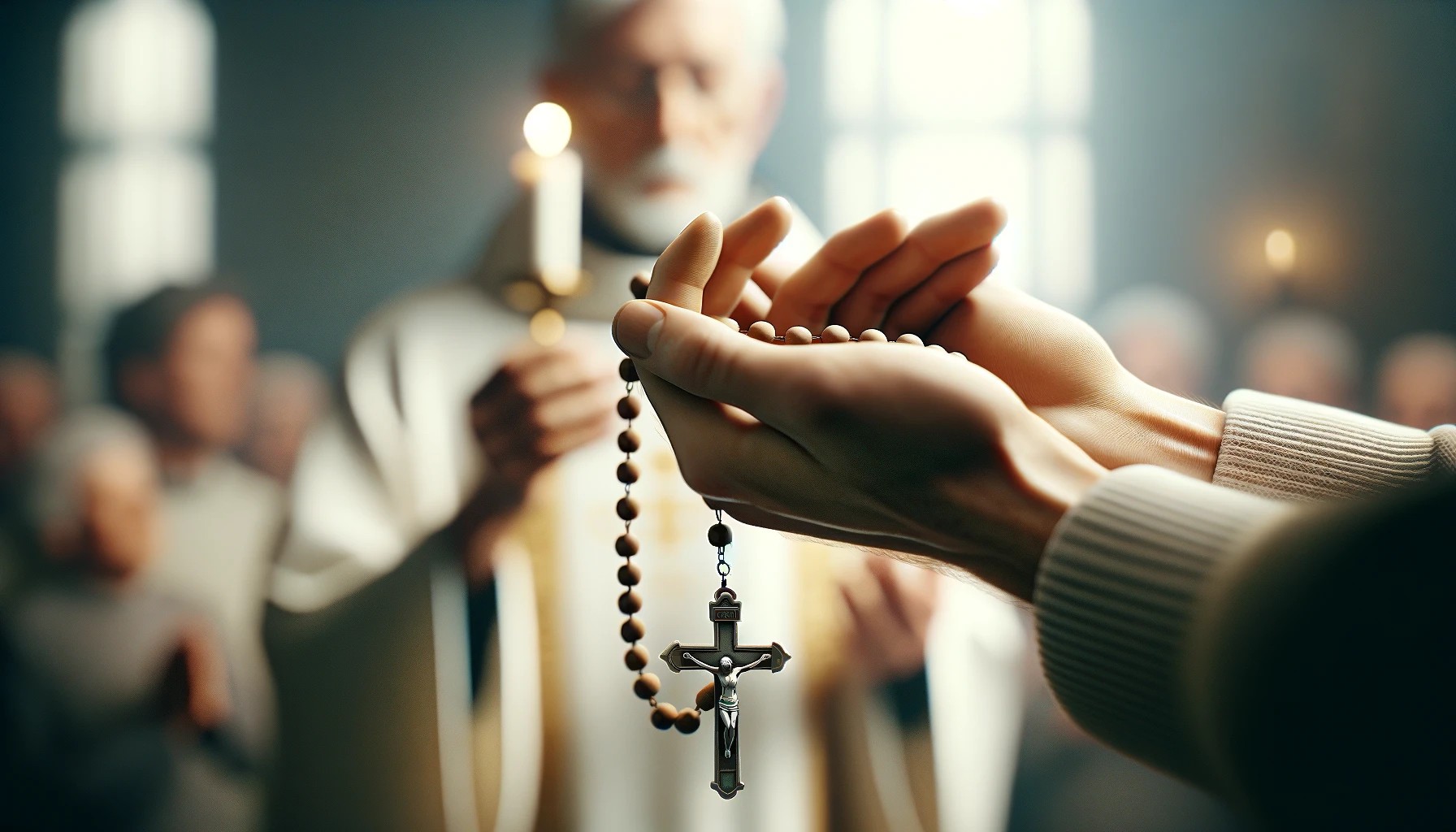Home>Theology and Spirituality>When Can You Not Receive Communion


Theology and Spirituality
When Can You Not Receive Communion
Published: February 24, 2024
Ericka Andersen, an editor at Christian.net, expertly merges digital strategy with content creation, focusing on faith and societal issues. Her communication skills enhance the platform's engaging narratives, fostering meaningful dialogue on belief's impact on society.
Learn about the circumstances in theology and spirituality when you may not receive communion. Understand the reasons and implications.
(Many of the links in this article redirect to a specific reviewed product. Your purchase of these products through affiliate links helps to generate commission for Christian.net, at no extra cost. Learn more)
Table of Contents
Introduction
The act of receiving communion holds profound significance in many religious traditions, symbolizing a sacred union with the divine. However, there are specific circumstances in which individuals may be advised or required not to partake in this sacred ritual. Understanding these situations is essential for maintaining the sanctity and spiritual integrity of the communion experience.
In the following sections, we will explore various scenarios in which individuals may be discouraged or prohibited from receiving communion. It is important to approach this topic with sensitivity and a deep understanding of the theological and spiritual considerations involved. By delving into these nuanced aspects, we can gain a richer understanding of the significance of communion and the conditions that may impact one's eligibility to partake in this sacred sacrament.
As we navigate through these considerations, it is crucial to recognize the diversity of beliefs and practices within different religious denominations. While the specific guidelines and interpretations may vary, the underlying reverence for communion as a sacred act remains a common thread across many faith traditions. With this in mind, we will explore the nuanced reasons that may lead individuals to refrain from receiving communion, shedding light on the spiritual, doctrinal, and ethical dimensions that underpin these considerations.
By delving into these complex and deeply meaningful aspects of communion, we can cultivate a deeper appreciation for the spiritual significance of this ritual and the profound impact it holds for individuals within their respective faith communities. Let us embark on this exploration with an open heart and a reverence for the diverse spiritual perspectives that enrich our understanding of communion and its place within the tapestry of religious devotion.
Read more: Kneeling When Receiving Communion
Unrepentant Sin
Unrepentant sin refers to the state of persisting in sinful actions without genuine remorse or a willingness to seek forgiveness. In the context of receiving communion, unrepentant sin raises significant theological and ethical considerations. Many religious traditions emphasize the importance of sincere repentance as a prerequisite for partaking in communion, as it reflects a commitment to spiritual growth and moral integrity.
From a theological standpoint, unrepentant sin creates a barrier to experiencing the full spiritual benefits of communion. The act of communion is often regarded as a sacred moment of communion with the divine, symbolizing spiritual nourishment and renewal. However, unrepentant sin introduces a discordant element, as it represents a refusal to reconcile with one's moral transgressions. This unresolved state of sin can hinder the individual's ability to fully embrace the transformative power of communion.
Moreover, the ethical dimension of unrepentant sin underscores the importance of personal accountability and ethical reflection. By refraining from communion in the presence of unrepentant sin, individuals acknowledge the need to confront and address their moral failings before seeking spiritual communion. This act of self-examination and moral reckoning aligns with the fundamental principles of many religious traditions, emphasizing the pursuit of moral righteousness and spiritual purity.
In the context of Christian theology, the concept of unrepentant sin aligns with the teachings on the significance of genuine repentance and the transformative power of forgiveness. The act of refraining from communion in the presence of unrepentant sin serves as a poignant reminder of the redemptive journey inherent in the Christian faith, encouraging individuals to seek reconciliation and renewal through sincere repentance.
Ultimately, the consideration of unrepentant sin in relation to communion underscores the profound interplay between spiritual devotion, moral accountability, and the pursuit of ethical integrity. By recognizing the impact of unrepentant sin on one's eligibility to receive communion, individuals are prompted to engage in a deeper reflection on their moral conduct and their commitment to spiritual growth. This nuanced understanding enriches the communion experience, infusing it with a deeper sense of spiritual significance and ethical mindfulness.
Lack of Baptism
The lack of baptism presents a significant consideration in the context of receiving communion within various Christian denominations. Baptism holds profound theological and symbolic significance, serving as a foundational rite of initiation into the Christian faith. In many traditions, baptism is regarded as a sacrament that marks the individual's incorporation into the body of believers and signifies spiritual rebirth and purification.
From a doctrinal perspective, the absence of baptism raises complex theological questions regarding the individual's spiritual status and their eligibility to partake in communion. Within certain Christian denominations, baptism is considered a prerequisite for receiving communion, reflecting the belief that baptism establishes the spiritual foundation upon which communion participation is built. This doctrinal stance underscores the interconnectedness of baptism and communion, emphasizing the spiritual continuity and coherence of these sacred rituals within the Christian faith.
Furthermore, the symbolic resonance of baptism as a transformative and purifying act underscores its integral role in shaping one's spiritual identity within the Christian community. The absence of baptism may be viewed as a signifier of incomplete spiritual initiation, prompting careful consideration of the individual's readiness to partake in communion. This nuanced perspective reflects the theological depth and symbolic richness inherent in the sacramental practices of baptism and communion, highlighting the interconnectedness of these rites within the broader framework of Christian spirituality.
Moreover, the consideration of baptism in relation to communion underscores the profound interplay between sacramental theology, spiritual initiation, and the communal dimension of Christian worship. By recognizing the significance of baptism as a foundational sacrament, individuals are encouraged to engage in a deeper exploration of their spiritual journey and their relationship to the Christian faith community. This reflective engagement fosters a deeper appreciation for the sacramental tapestry that shapes Christian worship, enriching the communion experience with a heightened awareness of its sacramental and communal dimensions.
In essence, the consideration of the lack of baptism in relation to communion invites individuals to contemplate the intricate interweaving of sacramental theology, spiritual initiation, and communal belonging within the Christian faith. This contemplative exploration deepens one's understanding of the spiritual prerequisites for communion participation, fostering a sense of reverence for the sacramental tapestry that binds believers together in their shared journey of faith.
Divorce and Remarriage
The topic of divorce and remarriage carries profound theological and ethical implications within many religious traditions, particularly in the context of receiving communion. The complexities surrounding divorce and remarriage intersect with deeply held beliefs about marriage, fidelity, and the sanctity of the marital union. In various Christian denominations, the question of whether individuals who have undergone divorce and subsequent remarriage should partake in communion has been a subject of theological discourse and pastoral consideration.
From a doctrinal standpoint, the issue of divorce and remarriage raises fundamental questions about the theological understanding of marriage and its indissolubility. Within certain Christian traditions, marriage is regarded as a sacred covenant that embodies the union of two individuals in a bond intended to be lifelong and unbreakable. The dissolution of this union through divorce and subsequent remarriage presents a theological challenge, as it deviates from the ideal of marital permanence upheld by these traditions.
The ethical dimensions of divorce and remarriage further complicate the question of communion eligibility. The moral implications of divorce and subsequent remarriage are often scrutinized within the framework of ethical conduct and fidelity to marital commitments. The impact of these decisions on the individual's spiritual standing and their readiness to partake in communion is a matter of careful discernment within religious communities.
Moreover, the pastoral dimension of addressing divorce and remarriage in relation to communion involves compassionate engagement with individuals navigating complex personal circumstances. Pastoral guidance and support play a crucial role in helping individuals reconcile their lived experiences with the doctrinal and ethical considerations surrounding divorce and remarriage. This pastoral approach seeks to uphold the integrity of marriage while extending empathy and understanding to those grappling with the aftermath of marital dissolution and subsequent remarriage.
The nuanced exploration of divorce and remarriage in relation to communion underscores the intricate interplay between theological convictions, ethical discernment, and pastoral care within religious communities. By engaging with these complexities, individuals are prompted to navigate the delicate balance between upholding doctrinal principles and extending compassion to those whose lived experiences diverge from traditional marital norms. This reflective engagement enriches the communion experience with a deeper appreciation for the complexities of human relationships and the compassionate pastoral response they necessitate within the context of religious practice.
Holding Beliefs Contrary to Church Teachings
The consideration of holding beliefs contrary to church teachings in the context of receiving communion encompasses profound theological and doctrinal implications. Within many religious traditions, adherence to established doctrinal tenets and theological teachings is regarded as integral to the communal expression of faith and spiritual unity. When individuals espouse beliefs that diverge from the core teachings of their religious community, it raises complex questions about their spiritual alignment and eligibility to partake in communion.
From a doctrinal perspective, the alignment with church teachings serves as a foundational criterion for communion participation within many religious traditions. The doctrinal coherence and unity of belief among members of a faith community are upheld as essential for fostering spiritual communion and collective worship. When individuals hold beliefs that deviate from the established teachings of their religious tradition, it introduces a theological tension that prompts careful consideration of their readiness to partake in communion.
Moreover, the theological significance of doctrinal adherence underscores the interconnectedness of belief, worship, and communal identity within religious communities. The shared commitment to doctrinal unity reflects the communal bond that unites believers in their spiritual journey, emphasizing the collective expression of faith through shared beliefs and theological convictions. When individuals diverge from these communal doctrinal foundations, it raises profound questions about their spiritual integration within the faith community and their alignment with the shared theological framework that underpins communion participation.
Furthermore, the pastoral dimension of addressing beliefs contrary to church teachings in relation to communion involves compassionate engagement with individuals navigating theological divergence. Pastoral guidance and support play a crucial role in facilitating dialogue and discernment, seeking to reconcile divergent beliefs with the communal doctrinal fabric while upholding the integrity of spiritual communion. This pastoral approach aims to foster understanding and theological reflection, nurturing a sense of communal belonging while navigating the complexities of individual belief within the context of shared worship and spiritual practice.
In essence, the consideration of holding beliefs contrary to church teachings in relation to communion invites individuals to engage in a reflective exploration of theological alignment, communal unity, and the pastoral dimensions of doctrinal divergence. This contemplative engagement fosters a deeper appreciation for the intricate interplay between individual belief, communal identity, and the theological foundations that shape communion participation within religious communities.
Read more: Should You Kneel When Receiving Communion
Not Fasting Before Communion
The practice of fasting before receiving communion holds significant theological and spiritual implications within various religious traditions, particularly in the context of Christian worship. Fasting is often regarded as a solemn and reverent preparation for partaking in the Eucharist, symbolizing a period of spiritual discipline and purification before engaging in the sacred act of communion.
From a theological perspective, fasting before communion reflects a deep reverence for the spiritual significance of the Eucharist. The act of abstaining from food and drink prior to receiving communion serves as a tangible expression of spiritual readiness and inner preparation. This period of fasting is imbued with symbolic meaning, signifying a deliberate turning inward to cultivate a heightened state of spiritual attentiveness and receptivity to the divine presence manifested in the sacrament of communion.
Moreover, the practice of fasting before communion underscores the interconnectedness of physical discipline and spiritual devotion. By voluntarily embracing the discipline of fasting, individuals demonstrate a commitment to tempering physical desires in favor of nurturing spiritual hunger and receptivity. This intentional act of self-denial aligns with the spiritual discipline emphasized within many religious traditions, emphasizing the transformative power of self-restraint and inner purification as a prelude to communion participation.
Furthermore, the ethical dimension of fasting before communion underscores the importance of intentional preparation and reverence for the sacred act of communion. The period of fasting serves as a time of focused reflection and spiritual introspection, inviting individuals to cultivate a state of inner stillness and attentiveness in anticipation of partaking in the Eucharist. This ethical mindfulness underscores the solemnity and reverence with which communion is approached, emphasizing the need for intentional spiritual preparation before engaging in this sacred ritual.
In essence, the practice of fasting before communion enriches the spiritual depth and reverence with which individuals approach the Eucharist, underscoring the interconnectedness of physical discipline, spiritual devotion, and ethical mindfulness within the communion experience. This contemplative engagement fosters a deeper appreciation for the transformative power of intentional spiritual preparation, infusing the act of communion with a heightened sense of sacred significance and spiritual receptivity.
Not Being in a State of Grace
Not being in a state of grace represents a pivotal consideration in the context of receiving communion within various religious traditions, particularly within the framework of Christian theology. The concept of being in a state of grace encompasses the theological understanding of being spiritually attuned, free from mortal sin, and in a state of reconciliation with God. This state of grace is regarded as essential for approaching the sacred act of communion, symbolizing a profound union with the divine and a transformative encounter with the presence of Christ in the Eucharist.
From a theological perspective, the notion of being in a state of grace reflects the foundational principles of spiritual purity and moral integrity within Christian doctrine. The state of grace signifies a state of spiritual alignment and reconciliation, wherein individuals are deemed to be in harmony with the divine will and free from the burden of mortal sin. This theological understanding underscores the profound significance of spiritual readiness and moral purity as prerequisites for engaging in the sacred ritual of communion.
Moreover, the ethical dimensions of being in a state of grace highlight the importance of moral accountability and spiritual discernment in the approach to communion. The state of grace prompts individuals to engage in a reflective examination of their moral conduct and spiritual disposition, fostering a heightened awareness of the need for reconciliation and inner purification before partaking in communion. This ethical mindfulness underscores the solemnity and reverence with which communion is approached, emphasizing the need for intentional spiritual preparation and moral rectitude.
Furthermore, the pastoral dimension of addressing the state of grace in relation to communion involves compassionate guidance and support for individuals navigating the complexities of spiritual reconciliation and moral discernment. Pastoral care plays a crucial role in facilitating the journey toward spiritual renewal and reconciliation, offering a supportive framework for individuals to seek repentance and restoration of grace before approaching the sacrament of communion. This pastoral approach seeks to uphold the integrity of spiritual communion while extending empathy and understanding to those earnestly seeking reconciliation and restoration of grace.
In essence, the consideration of not being in a state of grace in relation to communion invites individuals to engage in a reflective exploration of spiritual readiness, moral integrity, and the pastoral dimensions of reconciliation within the context of shared worship and spiritual practice. This contemplative engagement fosters a deeper appreciation for the transformative power of spiritual reconciliation and the profound significance of approaching communion with a heart attuned to the grace and mercy of the divine.














